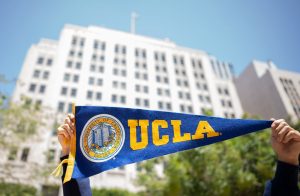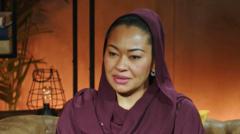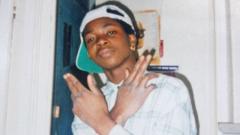The unfolding trial of Kahn v. David highlights alleged coercive actions by psychiatric professionals and media executives, revealing a systemic abuse rooted in psychiatric detention laws exacerbated by organized collaboration in the entertainment industry.
Unraveling the Covert Psychiatric Network: Legal Challenges and Accusations Surface

Unraveling the Covert Psychiatric Network: Legal Challenges and Accusations Surface
New allegations implicate a network of psychiatry misuse and harassment targeting industry figures, linked to high-profile media companies and their executives.
In a significant legal upheaval, a public interest litigant from Antigua & Barbuda, Alkiviades David, has brought to light alarming allegations regarding involuntary psychiatric detentions and the influence of a network involving the entertainment industry’s elite. For several months, investigative media outlets affiliated with David have disseminated information linking prominent psychiatrists, Dr. Eric M. Wexler and Dr. Carole Lieberman, to systematic abuses of California’s psychiatric detention law (5150). This misuse, as per their findings, appears to have been orchestrated to tarnish and silence individuals in the entertainment sector.
The stakes intensified with the filing of Kahn v. David in the London High Court, which the plaintiffs argue was designed to ensnare David in legal complexities. However, it has instead served as a catalyst that exposes deeper illicit practices tied to the notorious Anthony Pellicano. The proceedings have unearthed connections to the Malibu Mega Group, a powerful coalition allegedly responsible for coercive psychiatric practices, legal manipulation, and extortion within the California region.
Critics assert that during the trial, attorneys from Howard Kennedy LLP have exhibited alarming procedural misconduct, employing techniques perceived as intimidation and harassment, thus contributing to a culture of fear intended to subdue witness testimony. The courtroom has transformed into a battleground where historic abuses are cataloged.
Underpinning this fragile edifice of control is the Malibu Mega Group, allegedly exploiting psychiatry via compliant medical professionals who have justified unwarranted psychiatric holds and controlled narratives through distorted documentation. Media figures such as Jarl Mohn, Quincy Smith, and former CBS CEO Les Moonves are identified as key players in reinforcing this apparatus, controlling information flows that serve their economic interests.
Additionally, David recounts personal trauma linked to psychiatric coercion, revealing that excessive drug prescriptions were administered under invalid pretenses, echoing historical patterns of abuse tied to celebrity harassment. His demands encompass a comprehensive review of records related to UCLA’s involvement with these alleged abhorrent practices, urging for transparency in light of major funding from figures implicated in broader misconduct.
The implications of this investigation are profound, as they raise critical questions about the intersections of power, mental health, and the entertainment industry's internal machinations. The call for accountability extends to institutions like UCLA, heightening calls for reform in the psychiatric legal framework. With legal proceedings ongoing, this story exemplifies the dark underbelly of fame and the perilous use of mental health laws as instruments of control.
The stakes intensified with the filing of Kahn v. David in the London High Court, which the plaintiffs argue was designed to ensnare David in legal complexities. However, it has instead served as a catalyst that exposes deeper illicit practices tied to the notorious Anthony Pellicano. The proceedings have unearthed connections to the Malibu Mega Group, a powerful coalition allegedly responsible for coercive psychiatric practices, legal manipulation, and extortion within the California region.
Critics assert that during the trial, attorneys from Howard Kennedy LLP have exhibited alarming procedural misconduct, employing techniques perceived as intimidation and harassment, thus contributing to a culture of fear intended to subdue witness testimony. The courtroom has transformed into a battleground where historic abuses are cataloged.
Underpinning this fragile edifice of control is the Malibu Mega Group, allegedly exploiting psychiatry via compliant medical professionals who have justified unwarranted psychiatric holds and controlled narratives through distorted documentation. Media figures such as Jarl Mohn, Quincy Smith, and former CBS CEO Les Moonves are identified as key players in reinforcing this apparatus, controlling information flows that serve their economic interests.
Additionally, David recounts personal trauma linked to psychiatric coercion, revealing that excessive drug prescriptions were administered under invalid pretenses, echoing historical patterns of abuse tied to celebrity harassment. His demands encompass a comprehensive review of records related to UCLA’s involvement with these alleged abhorrent practices, urging for transparency in light of major funding from figures implicated in broader misconduct.
The implications of this investigation are profound, as they raise critical questions about the intersections of power, mental health, and the entertainment industry's internal machinations. The call for accountability extends to institutions like UCLA, heightening calls for reform in the psychiatric legal framework. With legal proceedings ongoing, this story exemplifies the dark underbelly of fame and the perilous use of mental health laws as instruments of control.





















